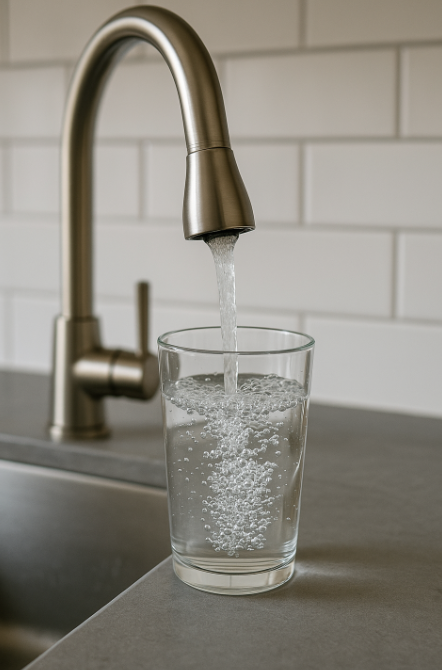Tap Water in Bend, Oregon - Ultimate Guide
Clean drinking water is something many people take for granted. In Bend, where outdoor living and sustainability are part of daily life, it makes sense to ask: Is the tap water safe? What’s in it? And should you be filtering it?
This guide answers those questions using data from official sources, including the City of Bend Utilities Department and the Environmental Working Group (EWG).
| Question | Answer |
|---|---|
| Is Bend’s tap water safe? | Yes, it meets or exceeds all legal standards |
| Main water sources? | Bridge Creek (surface water) and groundwater wells |
| Do I need a filter? | Not for safety, but helpful for taste or older homes |
| Is the water hard or soft? | Soft, low in minerals like calcium and magnesium |
Table of Contents
Where Bend’s Tap Water Comes From
Bend’s water comes from two main sources:
Bridge Creek, a surface water source in the Cascade Mountains
Groundwater wells located throughout the city
During the winter months, surface water makes up more of the supply. In summer, when demand increases, more groundwater is used. The city blends these two sources seasonally to meet water needs.
Source: City of Bend – Water Basics
Is Bend’s Tap Water Safe?
Yes, the City of Bend confirms that its water meets or exceeds all federal and state drinking water standards.
The city regularly tests for over 200 different contaminants. These include regulated substances like lead, chlorine, and bacteria, as well as unregulated compounds that may affect health or taste.
Each year, Bend publishes a Consumer Confidence Report (CCR) that provides full details on water quality and testing.
Source: City of Bend – Water Quality Reports
What’s in Bend’s Tap Water?
The EWG Tap Water Database shows that Bend’s tap water contains trace levels of some common contaminants. All detected substances are within legal safety limits.
Detected contaminants include:
Chloroform (a byproduct of disinfection)
Chromium-6 (naturally occurring in some groundwater)
Nitrate (can result from fertilizer use or natural sources)
While these are present at low levels, EWG notes that some of them exceed their own stricter health guidelines. These guidelines are more conservative than state or federal standards.
Source: EWG Tap Water Database – Bend OR4100100
How Is the Water Treated?
Bend’s water treatment system uses several methods to keep water clean and safe:
UV Disinfection kills microorganisms without adding chemicals
Chlorination prevents bacteria from growing in the distribution system
Filtration removes particles and organic material, especially from surface water
Groundwater from deep wells is already high-quality and usually requires less treatment.
Source: City of Bend – Water Basics
What About Water Hardness?
Bend’s water is naturally soft. That means it has low levels of calcium and magnesium.
Benefits of soft water include:
Less scale buildup in plumbing and appliances
Less soap needed for showers, laundry, and dishes
Longer lifespan for water heaters and coffee makers
Soft water is a hidden perk that many locals value, especially those moving from areas with hard water.
How Does Bend’s Water Taste?
Many residents say Bend’s tap water tastes clean, light, and fresh. The low chlorine levels and high mountain source contribute to the good taste.
Because the water doesn’t travel far and comes from high-quality sources, it generally lacks the “chemical” flavor found in water from larger cities.
Should You Use a Filter?
Using a filter is not required for safety, but some people choose one for peace of mind or better taste.
A basic activated carbon filter can:
Remove residual chlorine and organic compounds
Improve taste and odor
Reduce trace contaminants like chromium-6 or disinfection byproducts
A filter is also useful if you have older plumbing, where lead could leach into your water even if none is present at the source.
What About Lead?
The City of Bend reports that its water is not corrosive and does not contain lead when it leaves the treatment facility.
However, lead can enter drinking water through:
Older pipes or plumbing fixtures
Soldered joints in homes built before 1986
If you live in an older home, it may be worth testing your tap water. The city provides information and guidance on this process.
Source: City of Bend – Water Quality Reports
Is Bottled Water Better?
Not necessarily. Bottled water:
Is more expensive
Often comes from filtered municipal sources
Creates plastic waste
Bend’s tap water is safe, local, and regularly tested. Using a refillable water bottle is more sustainable and cost-effective.
Why Bend’s Water Matters to Locals
Bend is home to one of the most vibrant craft beer scenes in the country. Many breweries say the quality of the water is a key reason their beer tastes great. Soft, clean water with minimal treatment gives brewers a neutral base that’s easy to work with.
Local breweries benefit directly from the city’s high water standards—and so do residents.
How to Protect Bend’s Water
You don’t need to be a scientist or city official to help protect the water in Bend. Here’s what you can do:
Conserve water, especially in summer. Follow city irrigation schedules.
Avoid dumping chemicals (like cleaners, oils, or pesticides) down drains.
Use native landscaping. Plants that thrive in Central Oregon use less water and reduce runoff.
Fix leaks and install water-saving devices in your home.
Support local policies that protect our forests, rivers, and aquifers.
Small choices add up when it comes to water quality.
Stay Informed
To learn more or monitor updates:
Review Bend’s Consumer Confidence Report each year
Visit the EWG Water Database
Contact the City of Bend Utilities Department for any concerns
Bend’s tap water is clean, safe, and well-managed. It’s tested regularly and meets all state and federal standards. For most people, it can be enjoyed straight from the tap. If you want extra peace of mind, a basic filter can help. Either way, Bend’s water is a resource worth using and protecting.


